Way Too Indie’s Most Overrated And Underrated Films Of 2014
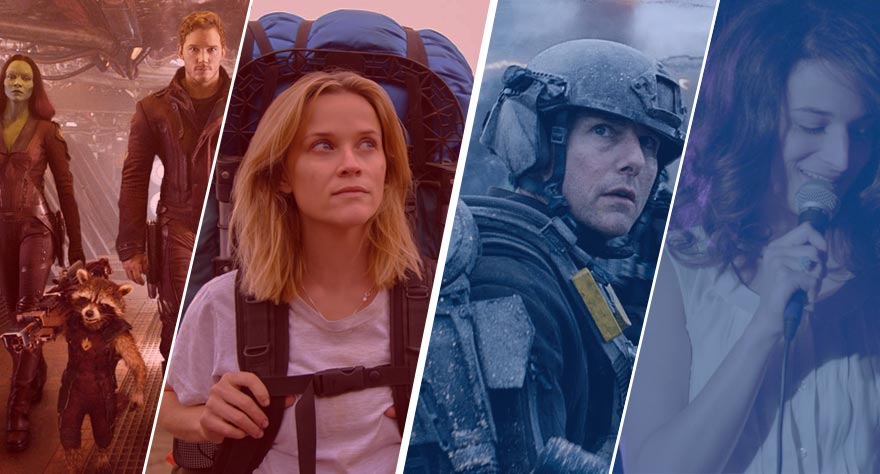
Not everyone likes the terms “overrated” and “underrated,” and it’s easy to understand why. For some, the words aren’t so much about the films they are applied to as much as a commentary on people’s opinions, and that direct line of attack on the majority can seem a little arrogant. But on the flip side, it’s hard to find two better words that describe what it’s like to disagree with the consensus.
And here at Way Too Indie, we have a wide, diverse group of writers. Want proof? Just look at our list of the Best Films of 2014, where we have a feel-good foodie comedy, a 3+ hour Turkish drama and an animated kids’ movie all on the same list. But there are plenty of times where we don’t all agree on the same thing.
This year we decided to give all of our writers an opportunity to vent out their frustrations at some of the films that either got too much love or not enough. We assigned all of our writers with a task: pick one film you find overrated, one you find underrated, and explain your picks. Read on to see the results, and don’t forget that these picks reflect each writer’s individual thoughts, not the site as a whole. Or, to put it a different way: make sure your hate mail goes to the right person.
Way Too Indie’s Most Overrated and Underrated Films of 2014
Dustin Jansick
Follow on Twitter
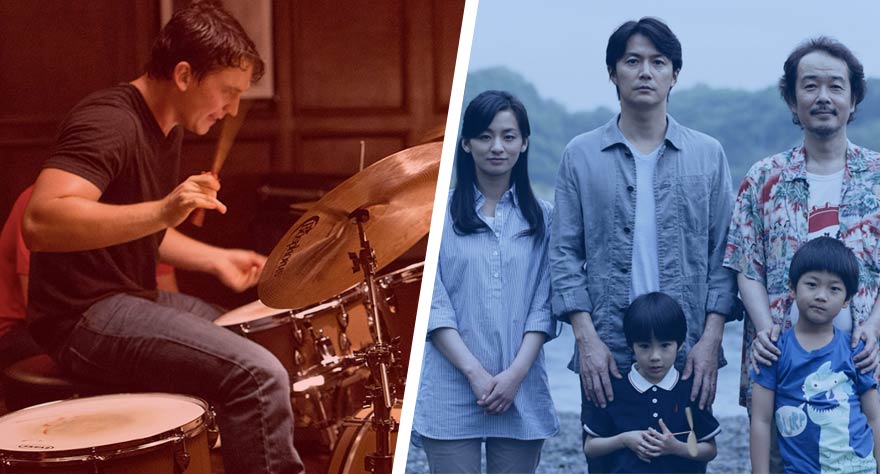
Whiplash is Overrated
Damien Chazelle’s Whiplash received overwhelming praise during its festival run and now sits at a whopping 96% Fresh rating on Rotten Tomatoes, creating the perfect storm for overestimation. Especially considering the film is a glorified sports movie that substitutes drum sticks for sporting equipment. And like most sports movies, Whiplash is wholly predictable and light in the story department. Here an aspiring drummer (Miles Teller) wants to join an elite jazz ensemble so badly that he’ll letting nothing—and I mean nothing—stand in his way. He briefly courts a pretty girl only to dump her just as quick, trying to show how little he cares about anything else. Then there’s the ludicrous car wreck scene where he crawls out of the vehicle covered in blood, yet he’s only concerned with getting to the performance on time (and somehow he manages to play!) The saving grace of the film is the fully committed J.K. Simmons as a perfection-demanding band instructor that most drill sergeants would be afraid of. When someone isn’t playing at his precise speed, he stops the show, humiliates the person in front of everyone, and insists the tempo changes. When played faster, it’s too fast. Slower, and it’s too slow. This gets repeated over and over until the point is made frustratingly clear. While it’s true Whiplash is exhilarating at times, as a whole it’s a slightly above average film about pushing people past their limits.
Like Father, Like Son is Underrated
Unlike the film mentioned above, Like Father, Like Son turns an outlandish situation into an unexpectedly profound narrative. Two Japanese families learn their children were switched at birth after six years of raising them as their own. Writer and director Kore-Eda Hirokazu explores the complex debate between nature and nurture without a predetermined right answer, making a case for both sides. Does six years of parenting outweigh genetics? You be the judge. Kore-eda adds to this philosophical dilemma by introducing contrasting social class between the two families: one family has a ton of wealth but lacks affection while the other family lacks financial prosperity yet provides undivided attention to their children. Like Father, Like Son displays expert craftsmanship, delightful performances (especially the adorable six-year-old), and an emotionally stirring narrative. Like all great films, Like Father, Like Son encourages discussion and inspires you to think. For reasons I don’t understand, the buzz generated during its Cannes premiere (has it really been two years?!) quickly faded. It’s a shame because this film deserves more attention.
C.J. Prince
Follow on Twitter
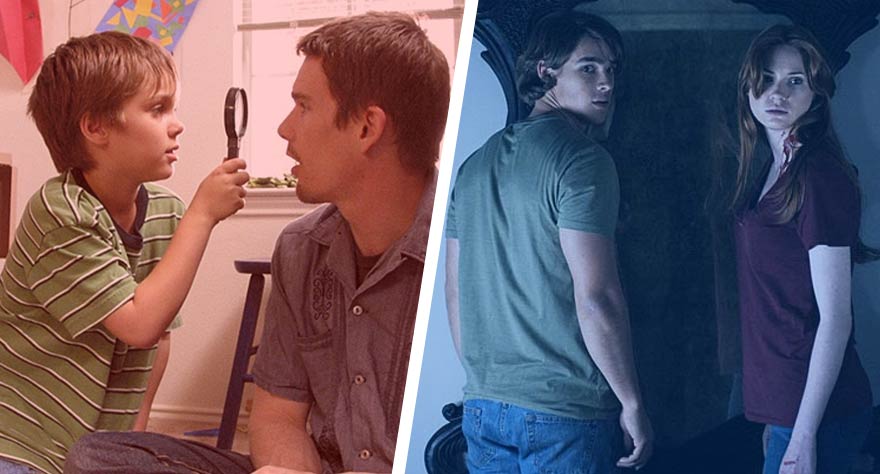
Boyhood is Overrated
I didn’t particularly care for Boyhood, which left me feeling pretty cold emotionally when I saw it earlier this year. I couldn’t explain my issues with it more succinctly than Fandor’s Kevin B. Lee, who said Boyhood “feels too much like an all-purpose anthem for the coming-of-age experience” and “lacks the intimacy and specificity” of Richard Linklater’s best work. The film never delves too much into its characters’ lives, sketching out details just enough to ensure as many people can relate to it without getting too precise, perhaps out of fear of alienating viewers.
In a way, I can’t blame Linklater for doing it this way; the shooting method probably made it difficult to get too detailed or specific (it could also explain why Linklater largely eschews narrative). But by doing this, Linklater sacrifices the emotional impact of the story for me, and that broadness leads to something bland. Yes, everyone has something they can relate to in Boyhood, and that’s the problem. It’s perfectly content with doing very little, acting as a blank canvas for viewers to project all they want on to it. And a blank canvas can be pretty boring to look at.
Oculus is Underrated
While everyone and their mother believes The Babadook is the best horror film of 2014 (I came very close to making it my overrated pick), I’m going with Mike Flanagan’s Oculus. It’s a horror film with an unconventional villain: a haunted mirror with the ability to mess with people’s heads, making them see things that aren’t really there. The more time one spends around the mirror, the harder it gets to discern between reality and illusion. And what Flanagan does so brilliantly is make his own film feel like it’s under the influence of the mirror, slowly throwing viewers into a headspace where it’s impossible to understand whether or not what’s on screen is actually happening.
It starts when the mirror shows its malevolence to the film’s two protagonists. The editing starts violating expectations, heightening the awareness of elliptical cuts (in other words, you can no longer fill in the blanks between each shot). And then the film’s flashback structure collapses in on itself, suddenly merging past and present into one. By its climax, Oculus reaches a disorienting fever pitch that’s a marvel to behold. Most horror movies have a hard time creating actual characters; Oculus gets inside its characters’ heads with an effectiveness rarely seen in today’s horror films.
Blake Ginithan
Follow on Twitter
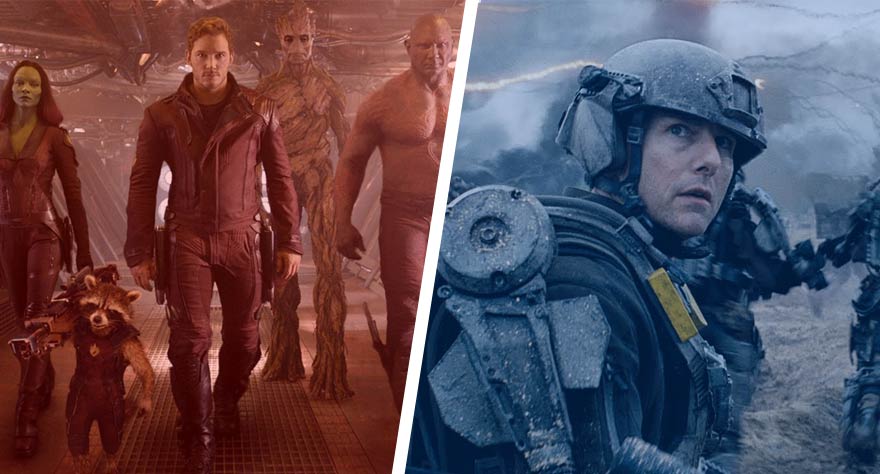
Guardians of the Galaxy is Overrated
Comic book movies are a dime a dozen now a days, thus one only really needs to be good to stand out. Marvel seemingly has a stranglehold on the market at the moment and is releasing anything it can to make money. Guardians of the Galaxy is neither enjoyably good nor enjoyably bad. It’s pure middle of the road boredom. I’d rather watch a gloriously bad movie that shoots for the stars than a film that plays everything by the numbers. Guardians of the Galaxy is a very bland comic book movie that isn’t interesting for a second. It contains not a single exciting character and not a single enjoyable scene. The action scenes fall pretty flat and the choice to use soul and funky pop songs as the soundtrack is a pretty dire, annoyingly distracting decision. Guardians of the Galaxy isn’t bad by any means; Chris Pratt proves that he will be a movie star in no time and director James Gunn shows he can handle a big budget. But Guardians of the Galaxy only shoots for middle ground and never once wants to rise above the crème to become something better.
Edge of Tomorrow is Underrated
I’m convinced the Tom Cruise we see outside of the movies (the one who jumps on couches) has ruined the Tom Cruise we see on the silver screen. It’s unfortunate, because Tom Cruise shows with Edge of Tomorrow that he is far and away the best movie star of all time. Here Cruise turns in one of his best performances not just of the last few years, but possibly of his entire career. It’s easy to dismiss Edge of Tomorrow as a sci-fi knock off of Groundhog Day but it’s so much more than that. The way we see Cruise’s character go from a complete pussy to an ass-kicking soldier throughout the course of this movie is sensational. And who better as his sidekick than Emily Blunt, who proves she can destroy aliens as aptly and easily as Ripley could? We can talk about the weak ending all we want, fine, but to deny everything you see before it is a sin. Edge of Tomorrow is one of the best Hollywood big budget films to be released in some time. It’s fun, grandiose, energetic, loopy, amusing, kinetic, emotional, and pulsating. Edge of Tomorrow was wrongly missed out on during its initial theatrical run.
Ananda Dillon
Follow on Twitter
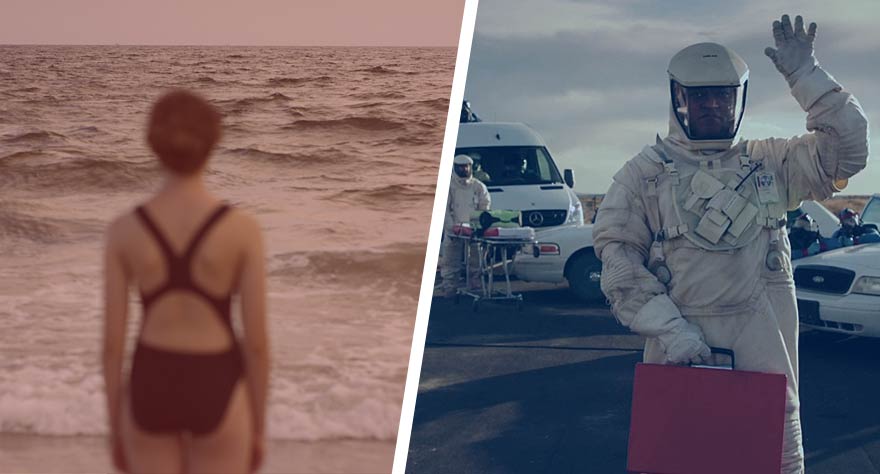
It Felt Like Love is Overrated
The great part about the Internet is I don’t need to worry about all of you out there shaking your heads at my opinion on It Felt Like Love. I hear what many of you have said about the film (including quite a few WTI staff; read our review): about how it portrays the difficulties of growing up in this modern age of sexual inundation on youth; about how honest Eliza Hittman’s depiction of crossing the line from girl to woman is conveyed; about its realistic and observational style of filmmaking. I’m sorry, but no. I was a teenage girl and nothing Lila (Gina Piersanti) experiences in this film resonates with any memories I have. I get that she’s a motherless, confused young lady motivated by envy and peer pressure, but her every decision in this film is so awkward it’s painful. Not even as a teenager did I know anyone so utterly unable to pick up on social cues. First she throws herself at a boy who, even as a known player, quite obviously wants nothing to do with her. Then it ends with her throwing herself into the way of molestation. It’s not an honest coming-of-age; it’s a scary look into worst-case-scenario for an oblivious girl being taken advantage of. Adding to the uncomfortable viewing experience is a lack of plot and excruciatingly slow pacing. It seems to me it’s easy to confuse amateur, awkward filmmaking for deliberate depth, and I found this film too uncomfortable to enjoy.
The Signal is Underrated
So it only received middling reviews after its Sundance premier and then limited release this year, and even I decried its more flagrant failings in my review, but despite what you’ve heard I’m here to say The Signal is still worth watching. In part it’s worth a watch only so that later when director William Eubank is off making huge sci-fi films that have us all (finally) buzzing, we’ll be able to say “I’ve appreciated his work since The Signal.” So there are bragging rights involved. But additionally The Signal also proves that a perfect film is near impossible to find, and what Eubank gets right far outweighs what he gets wrong. In fact, it’s less that he gets much wrong; he’s just missing a few key elements… like enough plot points. But let’s be honest; if any genre is guilty of putting form over function, it’s sci-fi. So even though the film decides not to answer all our questions, ultimately what we’re left with is the memory of the film’s stunning visuals. Eubanks got his start as a cinematographer, and The Signal showcases some imagery that would leave Michael Bay drooling. The film manages to be stylistic and artistic while also bombastic and blockbuster-looking, which is no easy feat. And despite plot discrepancies, there is no denying the steady tension he incites with this mystery. The reveals are truly shocking, and so, in some ways, you could argue The Signal is TOO good. It sets itself up so well in the first two-thirds that almost no ending could really satisfy. At least that’s my generous conclusion. But trust me on this, The Signal may be a head-scratcher, but it’s not a waste of time.
Bernard Boo
Follow on Twitter
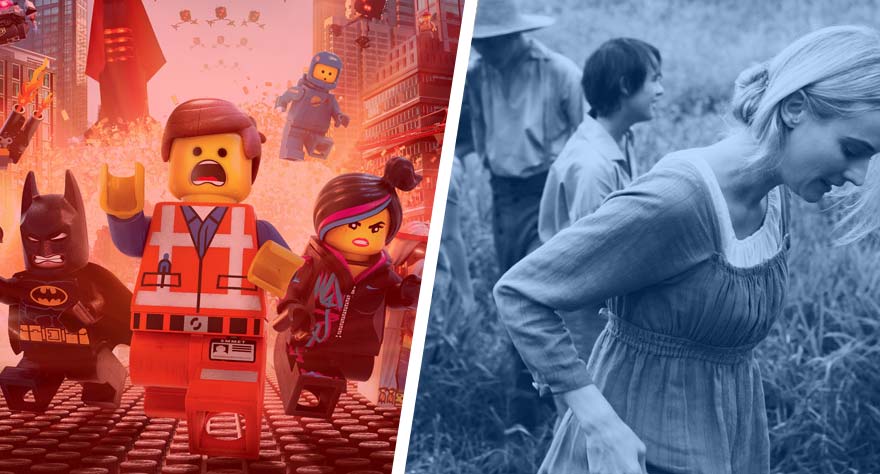
The LEGO Movie is Overrated
I must preface this by saying that The LEGO Movie was one of my favorite films of the year, which I understand may come off as a bit, well, confusing, as I’ve chosen to also label it as one of the year’s most overrated films. Phil Lord and Christopher Miller’s brand of witty, subversive humor speaks to millennials so directly that I understand (and share) all the adoration. But what bothers me about the enthusiasm behind The LEGO Movie is that it seems to come from a place that’s unreasonably dismissive of kids movies. Almost every time I read praise for The LEGO Movie, there’s some line that essentially says it’s “got heart, unlike other dumb kids movies”, which I can’t help but read as ignorant snark. All-ages movies are NOT intrinsically inferior. For every bad kids movie, there’s an equally horrendous rom-com, horror movie, or indie drama (just go to your local indie film festival for proof). Yes, The LEGO Movie is excellent, but excellent kids movies aren’t all that rare. Wreck-it Ralph, whose similarities to The LEGO Movie are innumerable, is just as good, just not edgy enough for cynical bloggers. Consider other kids movies from this year: Big Hero 6 wasn’t “dumbed-down”; The Boxtrolls was incredibly sincere and well-written; How to Train Your Dragon 2 is one of the best movie sequels of the past 5 years. The LEGO Movie was the best of the bunch, but geez…let’s all calm the eff down.
The Better Angels is Underrated
Most of the criticism levied against A.J. Edwards’ The Better Angels, a hypnotic period piece about a young Abraham Lincoln (played by Braydon Denney and referred to in the script as simply, “Abe”), is that it derides too blatantly and too much from the work of its producer, Terrence Malick. There’s fairness to that point, but the comparison seems to cloud the fact that, informing all of the low-angled, heavenly nature shots, there’s a beautiful story of spirituality and family that’s quite good. More importantly, these themes make the Malick-ian imagery entirely appropriate for the story Edwards is trying to tell. Terrific performances from Denney, Diane Kruger, Brit Marling, Jason Clarke, and Wes Bentley give the black and white visuals further richness. No, Edwards doesn’t do Malick better than Malick does Malick, but Malick’s given him the Malick stamp of approval, so if you love Malick like I love Malick (who doesn’t love Malick?), give this arthouse origin story a second (or first) try.
Aaron Pinkston
Follow on Twitter
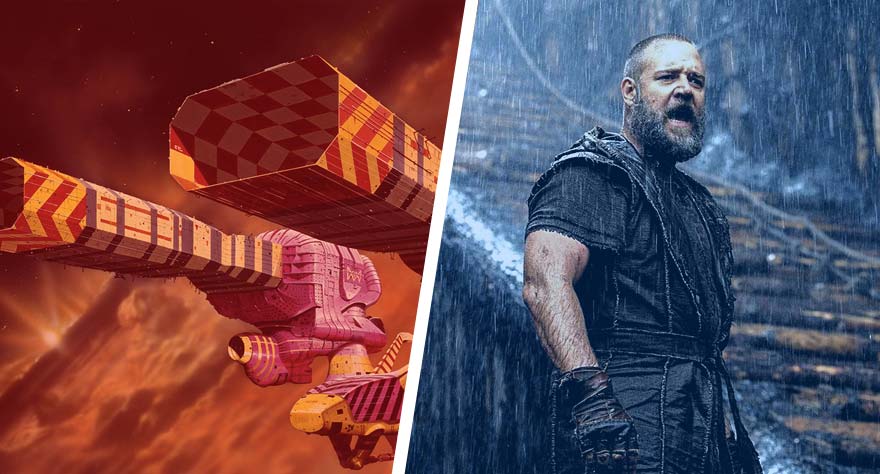
Jodorowsky’s Dune is Overrated
Every year is basically a great year for documentary film and 2014 is no exception. The pitch-perfect, clear-eyed portrait of Roger Ebert in Life Itself; the cloudy and pained portrait of a pastor in The Overnighters; the experimental vibrancy of Manakamana; the political nuance of Citizenfour—these (and many other) docs gave us integral and beautiful stories from around the world. Jodorowsky’s Dune is a fine film in itself, but it comes nowhere near the best docs of the year, though it seems many would hold it there. It knocks on two of my biggest cinematic pet peeves—one is basically unavoidable given the film’s story, while the other is completely inexcusable. First, I am always wary about using interviews as a shortcut to verify art, and this film goes there a lot, with talking head after talking head exclaiming how amazing Jodorowsky’s Dune would have been without letting the art speak for itself. Alejandro Jodorowsky is a very compelling figure and his films are among the most bizarre and wonderful ever made. And for some reason Frank Pavich makes a documentary chronicling the tale of the filmmaker’s flawed attempt at bringing the un-filmable novel Dune to the cinema with all the slickness and mainstream vibe that Jodorowsky despises. Sure, watching Jodorowsky ramble on about his worldview is something to see, and the “bringing the team together” section of the film is indeed entertaining, but overall, Jodorowsky’s Dune feels like a lot of wasted potential, much like its source story. Maybe that is what they were going for…
Noah is Underrated
Darren Aronofsky made his biggest movie in 2014, an oft-told tale which manages to feel very personal. Noah has its supporters (who might even outnumber its detractors), but I can’t help but get the feeling that it has already been forgotten. It has basically zero awards buzz, despite Aronofsky’s momentum after his most successful film Black Swan. I can only hope that it bounces back through a strong, loving minority that have championed Aronofsky’s The Fountain, but it probably is slightly too mainstream-feeling for that sort of audience to even give it a chance. Noah, though, is an almost perfect blend of the Hollywood blockbuster and its creator’s vision—it remains a little weird (the stop-motion rock monsters and animated sequences and such) though is probably Aronofsky’s most approachable work. Biblical epics are very hard to bring to the screen without pandering to the religious folks who pay to see them, but Noah balances ideas of the Christian God with atheist philosophies extraordinarily well. I am not a religious person, so I greatly appreciate the filmmaker’s focus on the relevant themes of this story with a naturally questioning tone. For a non-believer, he tells this story with a lot of grace. I was left deeply pondering our impact and place on this world, which is the right effect Noah’s tale should have.
Edward Haynes
Follow on Twitter
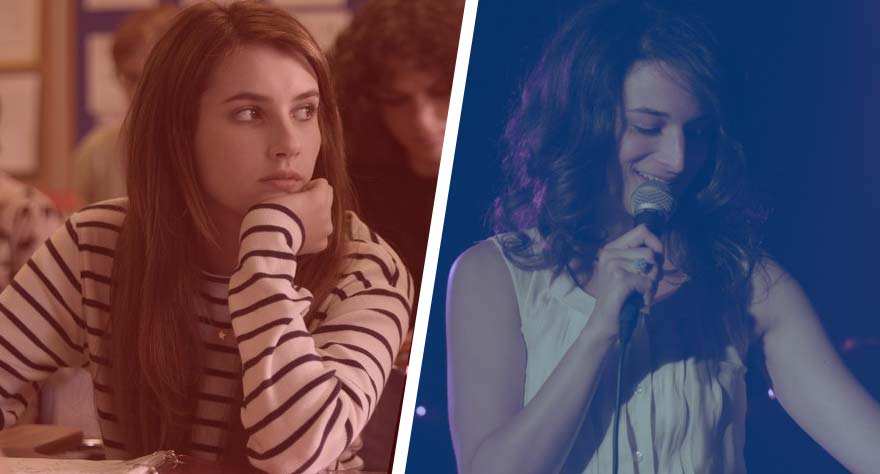
Palo Alto is Overrated
Directed by Gia Coppola, this drifting, meandering, dull film has arguably drawn more praise than it deserves because of the legacy of the Coppola name. Adapted from James Franco’s series of short stories, Palo Alto attempts to weave the lives together of its leads into one coherent piece of storytelling, but ultimately fails. It’s also filled with unlikable characters, who are difficult to relate to and painfully irritating. This would not necessarily be an issue if Palo Alto offered any sort of meaningful insight into youth culture, but you don’t learn anything from this film that couldn’t have been picked up from MTV. One redeeming feature in the film is Emma Roberts’ performance as April, but this is ruined by weak dialogue and an uninspiring performance by James Franco acting alongside her. It’s shot beautifully; Gia’s style is reminiscent of Sofia Coppola’s. You can have all the great cinematography in the world, but it won’t save a film with a poor script.
Obvious Child is Underrated
Obvious Child is a film that takes a refreshingly personal and honest approach to abortion. This alone is reason enough for the film to be commended, but just as importantly, Obvious Child puts as much emphasis on being an entertaining, funny and enjoyable film as it does on conveying any political message. This has possibly led to the film receiving less attention come awards season than it might have gotten had it conveyed its pro-choice message more forcefully. Yet its subtlety and reluctance to judge others make it an evocative and poignant film. Obvious Child also deserves praise for creating easily some of the most likeable characters of the year in a romantic comedy. Jenny Slate is brilliant in this film, funny and intelligent, as is Jake Lacey in a role that refreshingly subverts the ‘man-child’ stereotype perpetrated by Judd Apatow films. The need for more sweet and heartfelt romantic comedies like this has never been more apparent considering the cynical phase the genre seems to be in at the moment.
Michael Nazarewycz
Follow on Twitter
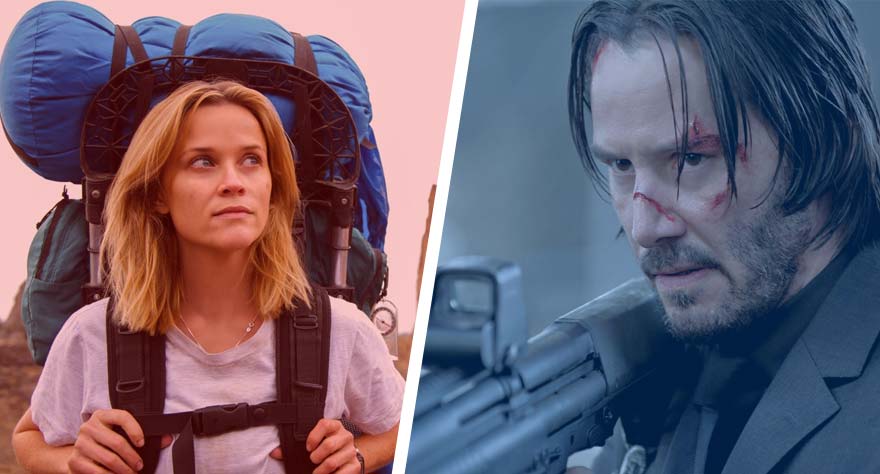
Wild is Overrated
Inspired by actual events, Wild tells the story of Cheryl Strayed, a woman with a troubled past who, in an effort to find herself, embarks on a 1,000-mile hike on the Pacific Crest Trail. It’s important to note that anyone who pulls themselves out of the darkness of addiction is worthy of praise, but as backstories go, Strayed’s is not all that remarkable. There’s no lack of people who’ve partaken in self-destructive behavior after a personal tragedy, and director Jean-Marc Vallée does nothing to indicate why Strayed’s story is more deserving to be told than anyone else’s … other than that 1,000-mile hike, of course. As for that hike, Vallée may highlight Strayed’s physical challenges–water shortages, backpack weight, bad shoes, etc.–but it is only ever an exercise in list-making. The hike is presented less as a journey and more as a highlight reel of Strayed’s most memorable moments on the trail. With both past and present unremarkable, tying them together is almost impossible, and the result is a random collection of flashbacks shown during oft-unrelated moments along the linear hiking trail. Witherspoon may shine, but her commitment to character is only a distraction.
John Wick is Underrated
To say John Wick is “underrated” is to make something of a relative statement. The film has certainly received praise, but that praise has felt somewhat faint. “John Wick is a great movie … for what it is.” But “for what it is” should be a compliment, not a caveat. In a cinematic action landscape that is overcrowded with men in tights, John Wick, starring the sharply dressed and perfectly stoic Keanu Reeves, is part homage to the action films of the ’80s and part ballet of violence, with every scene meticulously choreographed, blocked, shot, and edited. The excellence of the technical execution is what makes the film work, and all credit belongs to Chad Stahelski and David Leitch. Between them, the first-time co-directors have over 150 stunt-related film credits. This experience gives them the understanding necessary to turn John Wick from just another shoot-em-up to something stylish in design, exhausting in execution, and incredibly satisfying in total. Awards season always brings a lament that comedies don’t get their due. Maybe it’s time to include action films to that list.
Nik Grozdanovic
Follow on Twitter
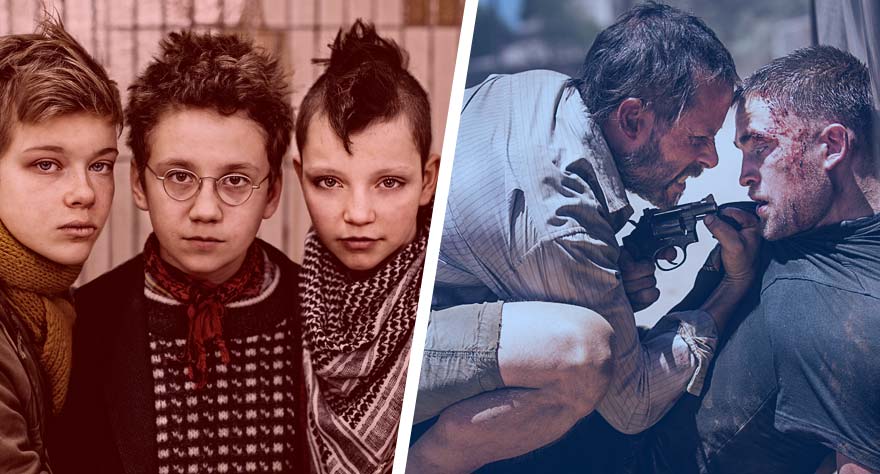
We Are The Best! is Overrated
Being derisive about Lukas Moodysson’s raucously titled We Are The Best! — currently standing at 97% on Rotten Tomatoes – might peg me as a self-loathing killjoy, but let me make something clear: I don’t hate it. The moments we spend with Bobo and Klara are filled with insatiable sweetness, which obviously touched a nerve (you’d have to be literally made of stone if you walked away feeling spiteful). But it’s nowhere near as good as critics make it out to be.
By placing it entirely in a 13-year-old world, the film is akin to spending an afternoon with 2 obnoxious pre-teenage girls who are screaming terrible lyrics in your ear and desperately seeking your attention. And it’s funny, because Bobo and Klara hate attention, but Moodysson’s complete imbalance of tone and stubborn insistence to keep the film’s rhythm strumming the same note for the full hour and 40 minutes is so desperate for it, the movie becomes an utterly disjointed experience. It’s as if the girls are directing him, which is fun for the first twenty or so minutes, but then it becomes a movie that feels like it’s directed by a 13-year-old. Yeah, I get it, THESE KIDS ARE SO CUTE, but that’s not enough to keep me interested in their impulsiveness and immaturity, regardless of how much your nauseating cinéma vérité in-your-face camera wants me to. Barkhammar, Grosin, and Liv LeMoyne are the best thing in it so Moodysson clearly knows how to create a freeing atmosphere on set. Too bad his direction smothers this freedom and, by unsubtly using a music genre only most adults can relate to, creates a manipulative and glaringly twee film, which is the complete opposite of punk, creating even more discord. But, yeah, they’re so adorable!
The Rover is Underrated
Premiering at Cannes, the follow-up to David Michôd’s critically acclaimed Animal Kingdom with Guy Pearce and a post-Twilight Robert Pattinson in central roles had most everyone smacking their lips in anticipation. However, the film’s anti-narrative approach to a story set in a post-apocalyptic Australian desert world, and the opaque development of Eric (Pearce) and Rey (Pattinson), left critics feeling, well, very critical. It currently stands at 65% on Rotten Tomatoes, but I’m convinced The Rover is headed toward years of re-evaluation with a more sober hindsight on its quiet, gripping, and poetic powers.
Let’s get the obvious out of the way; Pearce and Pattinson (yes, Pattinson) are both exceedingly intense, determined, and unwaveringly subtle in embodying their characters. The kind of performances commanded by quick looks and haunting stillness; they both add layers without speaking a word. Michôd’s bold approach (he must have realized he’d alienate so many people) to have almost no exposition and just let this one simple story (which he developed with Joel Edgerton) of a man wanting his car back in a financially fossilized and Godforsaken world speak for itself. It’s a sign of respect towards the fundamental rule of this craft; showing without telling, so being shot on 35mm film becomes even more symbolic. Natasha Braier’s cinematography also stands out thanks to the format, however, and the film’s colorful supporting characters all weigh in with their own individual ways. Not a perfect film by any stretch, but absolutely more worthy of praise than scorn.
